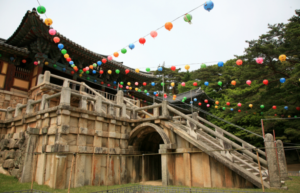Strongest Earthquake Recorded in South Korea
 When the cataclysmic earthquake and tsunami swept the east coast of Japan in 2011, South Koreans felt both terror and security. They were shocked that such a devastating earthquake could occur in Northeast Asia, but they were also relieved to realize South Korea’s insusceptibility to quakes occurring in the Pacific seismic activities. This may no longer be the case.
When the cataclysmic earthquake and tsunami swept the east coast of Japan in 2011, South Koreans felt both terror and security. They were shocked that such a devastating earthquake could occur in Northeast Asia, but they were also relieved to realize South Korea’s insusceptibility to quakes occurring in the Pacific seismic activities. This may no longer be the case.
On September 12th, a record-breaking earthquake struck the historic city of Gyeongju in the Southeast region of South Korea. The Korea Meteorological Administration (KMA) reported that the earthquake was the strongest earthquake recorded in the nation’s history. The KMA also added that a series of aftershocks followed throughout the night.
The tremors resulted in eight civilian injuries and more than a hundred cases of damage across the nation. Korea Hydro and Nuclear Power Co. halted the operation of four nuclear plants located near the epicenter of the quake and performed safety checks as a part of the safety manual.
Ko Yun-hwa, the chief of the KMA, assured the public the next day by saying that the Korean Peninsula is still safe from larger earthquakes that exceed magnitude of 6.5. He argued that South Korea “does not lie on any fault lines” and has remained relatively unharmed by severe seismic activities compared to neighboring Japan.
His optimistic comments, however, failed to allay growing public anxiety. Residents of Gyeongju continued to suffer from several aftershocks and fear of possible recurrence of large quakes. For more than two weeks, South Korea’s meteorological agency recorded 423 aftershocks and 250 property damage cases.
After detecting no clear signs of cessation, The Ministry of Public Safety and Security designated the North Gyeongsang province, including the city of Gyeongju, as “a special disaster zone” and granted emergency relief and financial support. The Ministry also announced its plan to conduct a field investigation to confirm the safety of public facilities in the region by the end of this year.
South Korean experts also reaffirmed the country’s relative safety from strong earthquakes that can cause major casualties and serious destruction. Chi Heon-cheol, a researcher at Korea Institute of Geoscience and Mineral Resources, claimed that South Korea “is not conducive to a major earthquake”, but “we need to be more cautious” in the regions where nuclear reactors and radioactive waste disposal facilities are present.
